Immerse yourself in the timeless love stories of biblical couples, and discover the lessons they hold for relationships today.

List of All Couples in the Bible
As they say, behind every great man is a great woman, and this rings true throughout the biblical narratives. You've likely heard of Adam and Eve, the quintessential first couple, but their story is just the beginning.
From Abraham and Sarah's journey of faith to the undying love between Jacob and Rachel, each couple presents a unique perspective on love, sacrifice, and devotion. Exploring these relationships not only sheds light on their spiritual significance but also unveils timeless lessons on human connection and partnership.
So, let's take a closer look at these pairs, and you might find yourself inspired by their stories in ways you hadn't anticipated.
Key Takeaways
- Biblical narratives feature couples like Adam and Eve, and Abraham and Sarah, setting precedents in love and faith.
- Couples such as Isaac and Rebekah, and Ruth and Boaz, highlight themes of divine guidance and loyalty.
- Challenges and trials, including ethical dilemmas and societal divides, are central to the stories of couples like Isaac and Rebekah, and Ruth and Boaz.
- The complexities of relationships, showcasing love, betrayal, and redemption, are explored through couples like Jacob and Rachel, and Abraham and Sarah.
The First Couple: Adam and Eve
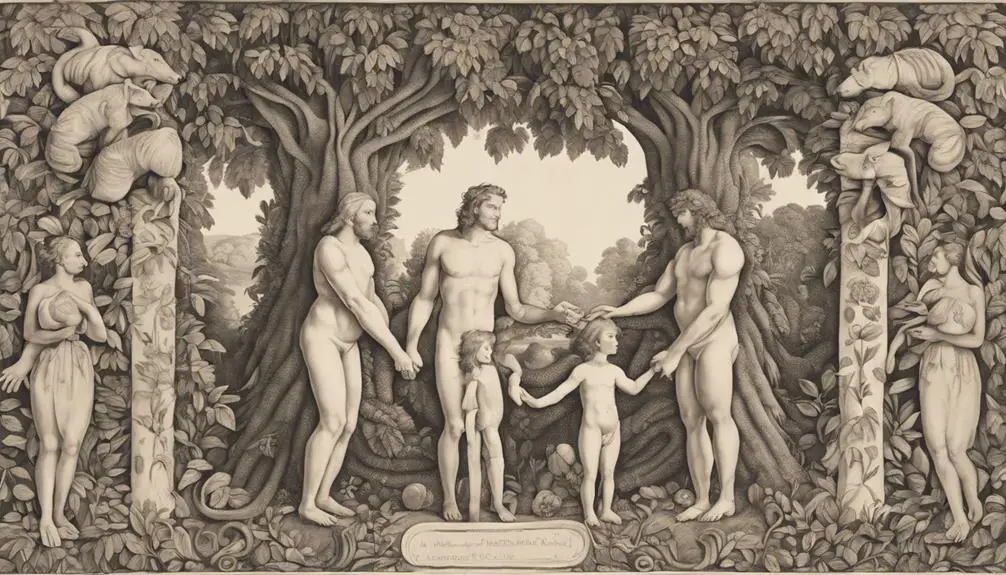
In analyzing the narrative of Adam and Eve, it's evident that this archetypal couple sets a foundational precedent for themes of companionship, disobedience, and consequence within the broader biblical context. You're introduced to them as the first humans, placed in Eden's garden, a setting that symbolizes purity and innocence. Their story, however, swiftly transitions into a profound exploration of human nature and morality.
The concept of original sin emerges directly from their actions. You see, they're instructed not to eat from the Tree of Knowledge of Good and Evil. Yet, influenced by external temptation, they defy this command, leading to their expulsion from Eden. This moment isn't just a narrative pivot; it encapsulates a theological cornerstone about the inherent flaws in human nature and the inevitable pull towards disobedience.
Moreover, their story in Eden's garden doesn't merely serve as a historical or mythical account; it offers deep insights into the human condition. It highlights the complexities of free will, the harsh realities of consequence following disobedience, and the enduring nature of companionship amidst adversity. Through Adam and Eve's narrative, you're confronted with the intricate interplay between choice, responsibility, and redemption.
Love and Devotion: Abraham and Sarah
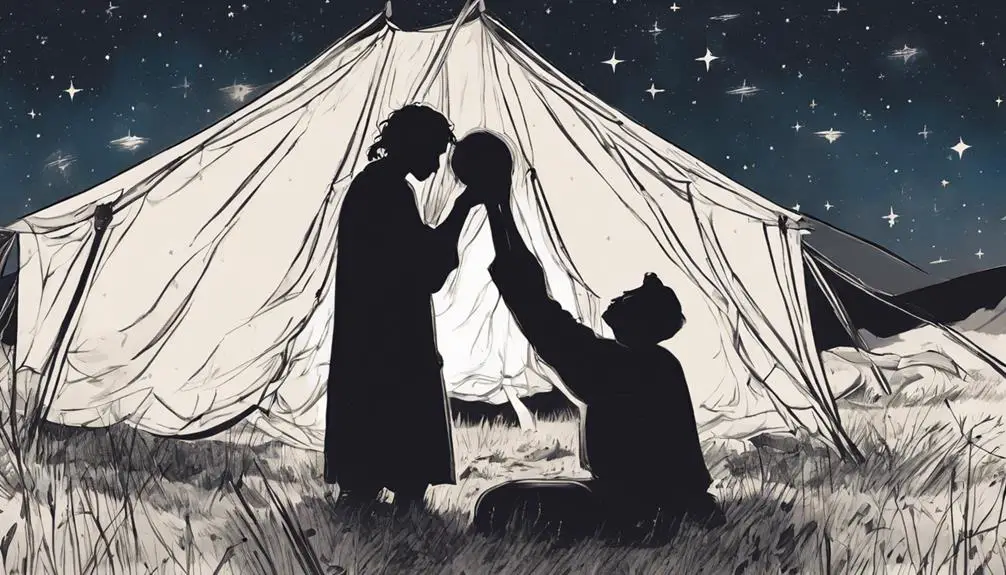
Exploring the relationship between Abraham and Sarah unveils a complex tapestry of love, devotion, and the challenges of faithfulness amidst life's trials. Their story, deeply embedded in the fabric of biblical narratives, offers profound insights into the dynamics of their partnership, marked notably by a significant age difference and the overarching theme of promise fulfillment.
Scholars often highlight the age difference between Abraham and Sarah as a critical element, reflecting not just societal norms of their time but also adding layers to their faith journey. This difference, while substantial, doesn't overshadow their mutual respect and unwavering commitment to each other and their shared destiny.
Central to their narrative is the promise made by God to Abraham, that he'd be the father of many nations. Despite their advanced years, this promise stands as a testament to their faith and the strength of their relationship. Sarah's eventual conception of Isaac is a pivotal moment, symbolizing the fulfillment of God's promise and underscoring the depth of their love and devotion. This episode in their lives beautifully illustrates how, despite doubts and trials, their faith in each other and in God's promise remains unshaken.
Trials of Faith: Isaac and Rebekah

Just as Abraham and Sarah's journey showcased the complexities of faith amid promise, the narrative of Isaac and Rebekah further unfolds the trials of faith within the framework of marital dynamics. You'll find that their story is a testament to the intricate interplay between family dynamics and divine intervention, shaping their lives and the future of their lineage.
Aspect |
Description |
Impact on Faith |
|---|---|---|
Marriage Arrangement |
Orchestrated by divine guidance, ensuring Isaac's lineage. |
Strengthens reliance on divine plans. |
Famine Test |
Faced with famine, they moved to Gerar, trusting in God. |
Highlights resilience and faith in providence. |
Deception Incident |
Isaac mimics Abraham's fear-induced deceit in Gerar. |
Challenges ethical dimensions of faith. |
Birth of Twins |
Esau and Jacob's birth was foretold by God. |
Demonstrates divine intervention in family dynamics. |
Blessing Controversy |
Rebekah's scheme to secure Jacob's blessing from Isaac. |
Reflects complexity of faith in family decisions. |
Analyzing Isaac and Rebekah's journey, you encounter a profound narrative of faith's trials and triumphs. It's a narrative that not only defines their personal evolution but also sets the stage for the unfolding of biblical history through divine intervention and complex family dynamics.
A Love Story: Jacob and Rachel

Amid the tapestry of biblical narratives, the love story of Jacob and Rachel emerges as a compelling exploration of devotion and sacrifice, illustrating the profound impact of personal relationships on faith's journey. Their story isn't just a romance; it's a complex tale of desire, deceit, and the dynamics of family relationships that offers deep insights into human nature and divine providence.
- Laban's Deception: Jacob's love for Rachel was so profound that he agreed to work for her father, Laban, for seven years to marry her. However, Laban deceived Jacob, substituting Leah, Rachel's older sister, on the wedding night. This act of deception not only complicates the narrative but also introduces the themes of trust and betrayal, pivotal in understanding the intricacies of human relationships and divine justice.
- Leah's Role: Leah's insertion into this love story isn't merely incidental. Her role illuminates the complexities of love, envy, and the human desire for recognition. It also reflects the societal norms and personal struggles within familial bonds, challenging readers to empathize with each character's plight.
- Enduring Love: Despite these trials, Jacob's love for Rachel endured. He worked an additional seven years for Laban to marry his true love, Rachel. This perseverance underlines the narrative's emphasis on loyalty, sacrifice, and the transformative power of love, offering a profound commentary on the nature of commitment.
This story, rich in emotion and ethical dilemmas, invites a deeper reflection on the roles of faith, love, and sacrifice in one's life.
Unwavering Loyalty: Ruth and Boaz
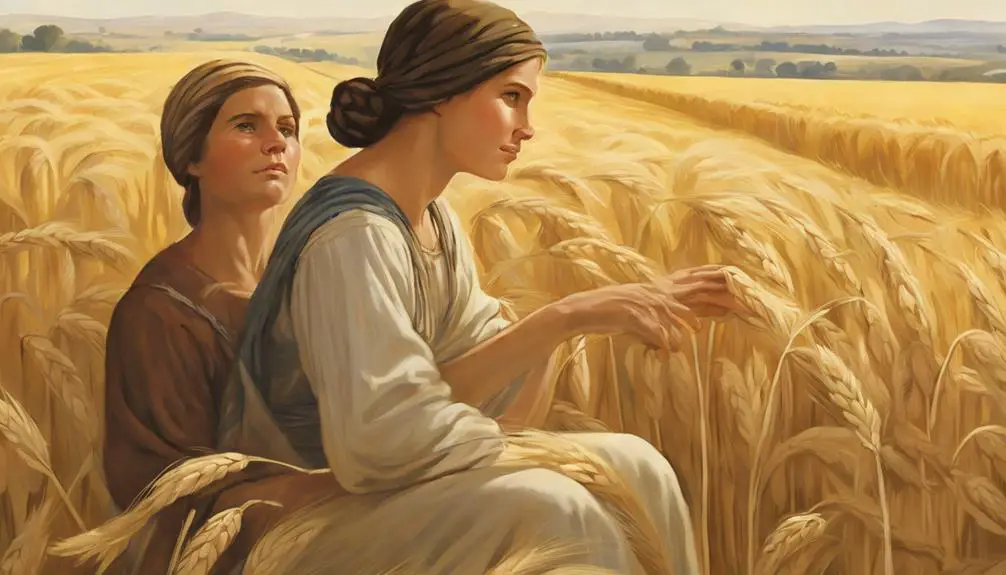
In the narrative of Ruth and Boaz, we witness an exemplary model of unwavering loyalty that transcends the mere bonds of kinship, highlighting the profound implications of steadfastness and kindness within the context of personal and communal redemption. Ruth, a Moabite widow, pledges fidelity to Naomi, her Israelite mother-in-law, demonstrating that true loyalty defies social stratification and ethnic barriers. Her actions lead her to Boaz, a relative of Naomi's late husband, who becomes a paragon of generosity and protector within the narrative.
Boaz's acceptance and eventual marriage to Ruth underscore the potential for economic redemption through the institution of levirate marriage, a practice aimed at preserving the lineage and property within a family. This union not only secures Ruth and Naomi's economic well-being but also integrates Ruth into the community of Bethlehem, challenging and redefining societal norms.
Through Ruth and Boaz, the narrative articulates a theology of loyalty that encompasses both divine and human realms, suggesting that steadfast loyalty can lead to personal and societal transformation. Their story illustrates how acts of kindness can bridge the divides of social stratification, offering a blueprint for redemption that's both communal and individual.
Frequently Asked Questions
How Did Cultural Norms of Their Times Influence the Relationship Dynamics of Biblical Couples Not Covered in the Listed Sections?
Cultural norms significantly shaped the dynamics of relationships in biblical times, particularly through marital hierarchies and economic dependencies.
You'll find these norms dictated roles within a marriage, often placing men in positions of authority and women in dependent roles.
This structure wasn't just societal; it was deeply entrenched in the fabric of daily life, influencing how couples interacted, made decisions, and even how they perceived love and duty within their partnerships.
Are There Examples of Couples in the Bible Who Faced Challenges Due to Differences in Religious Beliefs, and How Did They Navigate These Differences?
You're exploring how interfaith marriages in the Bible presented unique challenges. A prime example is Ruth and Boaz.
Ruth, a Moabite, initially followed a different religion from Boaz, an Israelite. Their story illustrates religious conversion, as Ruth adopts Boaz's faith, saying, 'Your people will be my people, and your God, my God.'
This narrative highlights the complexities and resolutions within interfaith relationships, emphasizing mutual respect and religious adaptation as key to overcoming differences.
How Are the Roles and Contributions of Women in These Biblical Relationships Depicted Outside of the Traditional Love and Support Narrative?
You'll find that beyond the typical love and support roles, women in these narratives often showcased significant female leadership and made vital economic contributions.
Their actions were pivotal, not just in their personal lives but also in broader societal contexts.
What Lessons on Forgiveness and Reconciliation Can Be Drawn From the Conflicts Experienced by Biblical Couples Not Mentioned in the Provided Sections?
Exploring conflicts outside those mentioned, you'll find that healing through empathy and overcoming communication barriers are pivotal. Analyzing these narratives, it's evident that empathy fosters understanding and mends rifts, demonstrating a powerful lesson in forgiveness.
Moreover, identifying and tackling communication barriers is crucial for reconciliation. These stories offer detailed, scholarly insights into how addressing emotional wounds and enhancing dialogue can lead to profound healing and stronger relationships.
Can We Find Examples of Non-Traditional Family Structures or Relationships in the Bible That Offer a Broader Understanding of Love and Partnership Beyond the Couples Listed?
Absolutely, you'll discover the Bible showcases non-traditional family structures and relationships that broaden the understanding of love and partnership. It's not just about romantic ties; it includes platonic bonds and divine unions, offering a nuanced perspective on relationships.
These examples reflect a spectrum of connections, emphasizing that love and partnership transcend conventional definitions. They encourage a deeper appreciation of the varied ways love manifests, beyond traditional pairings.
Conclusion
In analyzing the biblical couples mentioned, it's evident that their relationships are foundational to understanding the complex dynamics of love, faith, and loyalty in biblical narratives.
Each couple's story, from Adam and Eve's beginning of humanity to Ruth and Boaz's unwavering loyalty, offers unique insights into the societal and spiritual values of their times.
These narratives not only depict the personal virtues and trials of the individuals involved but also reflect broader themes of commitment, redemption, and divine providence within the biblical text.

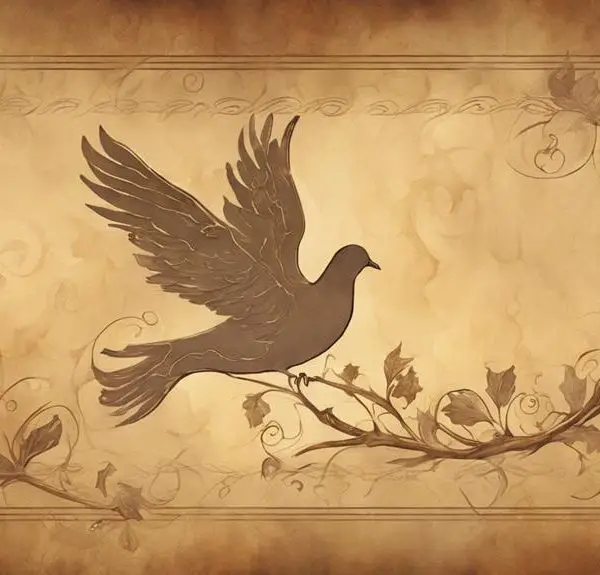
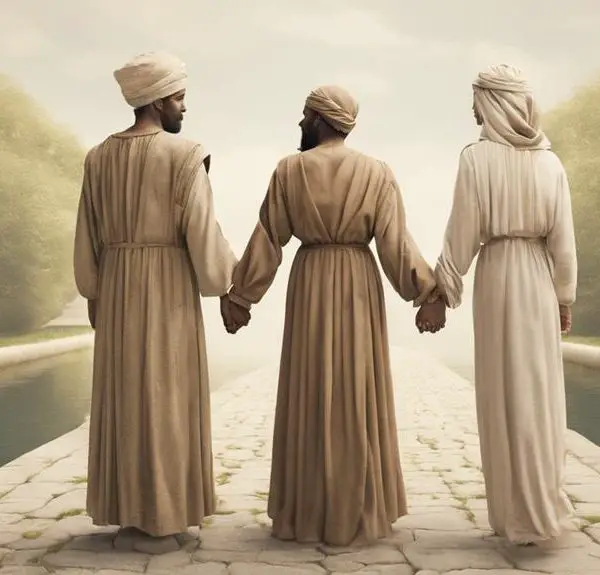
Sign up